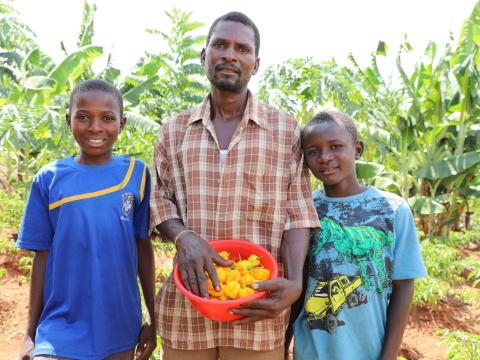Transforming agricultural practices to the benefit of Children in Tanzania

Agriculture is the back bone of Tanzania's economy and employs more than 60% of the rural population. Poor knowledge, lack of capital and limited access to market have been major challenges for community members in their implementation of various agricultural projects. This makes small-scale farmers more vulnerable and poorer.
World Vision's Mkumburu Area Programme (AP) with funding from World Vision's Hong Kong Office, has capacitated farmers on improved farming technology, and linked them with markets so as to ensure the well-being of sponsored children and communities at large.
Stanley Paulo (38) who has two sponsored children; Nestory (12) and Dominic (10) is a beneficiary to the farming project. He notes that, “through different training World Vision taught me on tree, vegetable and maize farming. I was able to establish a tree nursery, and expand my vegetable and maize farming. While exploring my way around vegetable farming; pepper farming has been of my choice due to the fact that it tolerates weather and it’s hard to be attacked by pests as compared to other vegetables. Also, it has high market for every harvesting period. I don’t suffer around looking for customers but rather they come looking for me.”

Farming has improved the well-being of Stanley’s family and improved the life of his children.
“Before the intervention, we were not able to take three meals a day, school fees payment was challenging, and also having school materials on time. Now, we are confident and certain of our education, health and nutrition well-being!", says Nestory, who is a class six student at a nearby primary school.